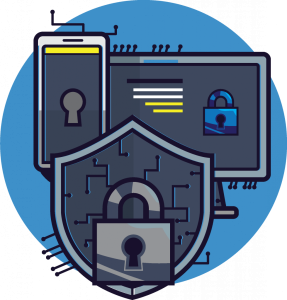Cyber-attacks detection and prevention
4. Manifestations of cybercrime
4.10. Cracking
The term cracking is associated with the term hacking, sometimes even these terms are incorrectly confused by the public or in the media. The term can be translated into Czech as “louskání” or “pukání”. In terms of content, the term cracking means breaking or circumventing the protective elements of a computer system, programs or applications, with the intention of their subsequent unauthorised use.
Crackers are often hackers from the black hat category, i.e. those who make breakthroughs in systems in an attempt to cause damage to a user, obtain information, or enrich themselves or others. Furthermore, cracking is mainly associated with copyright and related rights infringement. In this sense, cracking is an act consisting in the circumvention of protective elements that prevent the creation of copies or the illegal use of computer programs and music or film products (film or music CDs, DVDs, etc.). These security elements are used as means of copyright protection in the sense of Section 43 (1) of the Copyright Act, as amended.
One of the forms of cracking is “password cracking” used to determine the access password to a computer system, licensed system or program. When it comes to copyright infringement, a cracker usually creates a keygen or crack [1] , which allows the subsequent use of the program. Programs modified in this way are usually shared on warez forums or P2P networks.
Possibilities of criminal sanctions in the Czech Republic
Actions of an offender, within which the protection of a computer system or program is breached, with the intention of obtaining information and their subsequent unauthorised use, fulfills the objective elements of a criminal offence under Section 230 (1) or (2) (Unauthorised access to computer system and information carrier) of the Criminal Code. If the aim of a cracking attack is to gain an unjustified benefit for oneself or another, it is also possible to apply the provisions of Section 230 (3) of the Criminal Code.
Criminal liability under Section 231 (Measures and storage of the access device and password to the computer system and other such data) of the Criminal Code is not excluded either. During the distribution of a protected copyright work, Section 270 (Infringement of copyright, rights related to copyright and rights to the database) of the Criminal Code is fulfilled.
Possibilities of criminal sanctions in Poland
The same laws apply as for hacking.
Possibilities of criminal sanctions in Portugal
As mentioned, the illegal creation, distribution or dissemination of any computer programme, executable instruction, code or data intended to perform an illegal access to a computer system is penalised as being an Illegal access (Art. 6(2) of the Cybercrime Law), as aggravated offence if the offender had access to a trade secret or confidential data, the same in case of a relevant unjustified benefit (Art. 6(4) of the Cybercrime Law).
Again, the circumvention of any effective technological measures related to rights-management information is criminalised (Arts. 217 to 219 and 224-224 of the Code of Copyright and Related Rights).
[1] Keygen – Key Generator. Program generating serial numbers or other data. Crack – a program used to remove or reduce the functionality of protection elements of another program.
